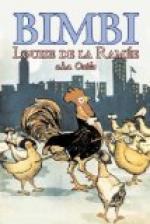Then he stopped, and a sob rose again in his throat.
“He is crazy!” said the people, laughing, yet a little scared; for the priest at Zirl had said rightly, this is not an age of faith. At that moment there sounded, coming from the barracks, that used to be the Schloss in the old days of Kaiser Max and Mary of Burgundy, the sound of drums and trumpets and the tramp of marching feet. It was one of the corps of Jagers of Tyrol, going down from the avenue to the Rudolfplatz, with their band before them and their pennons streaming. It was a familiar sight, but it drew the street throngs to it like magic: the age is not fond of dreamers, but it is very fond of drums. In almost a moment the old dark arcades and the riverside and the passages near were all empty, except for the women sitting at their stalls of fruit or cakes, or toys, They are wonderful old arched arcades, like the cloisters of a cathedral more than anything else, and the shops under them are all homely and simple—shops of leather, of furs, of clothes, of wooden playthings, of sweet and wholesome bread. They are very quaint, and kept by poor folks for poor folks; but to the dazed eyes of Findelkind they looked like a forbidden paradise, for he was so hungry and so heartbroken, and he had never seen any bigger place than little Zirl.
He stood and looked wistfully, but no one offered him anything. Close by was a stall of splendid purple grapes, but the old woman that kept it was busy knitting. She only called to him to stand out of her light.
“You look a poor brat; have you a home?” said another woman, who sold bridles and whips and horses’ bells and the like.
“Oh, yes, I have a home—by Martinswand,” said Findelkind, with a sigh.
The woman looked at him sharply. “Your parents have sent you on an errand here?”
“No; I have run away.”
“Run away? Oh, you bad boy!—unless, indeed—are they cruel to you?”
“No; very good.”
“Are you a little rogue, then, or a thief?”
“You are a bad woman to think such things,” said Findelkind, hotly, knowing himself on how innocent and sacred a quest he was.
“Bad? I? Oh ho!” said the old dame, cracking one of her new whips in the air, “I should like to make you jump about with this, you thankless little vagabond. Be off!”
Findelkind sighed again, his momentary anger passing; for he had been born with a gentle temper, and thought himself to blame much more readily than he thought other people were,—as, indeed, every wise child does, only there are so few children—or men—that are wise.
He turned his head away from the temptation of the bread and fruit stalls, for in truth hunger gnawed him terribly, and wandered a little to the left. From where he stood he could see the long, beautiful street of Teresa, with its oriels and arches, painted windows and gilded signs, and the steep, gray, dark mountains closing it in at the distance; but the street frightened him, it looked so grand, and he knew it would tempt him; so he went where he saw the green tops of some high elms and beeches. The trees, like the dogs, seemed like friends. It was the human creatures that were cruel.




